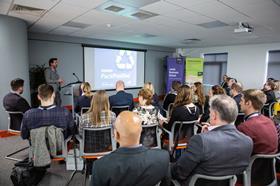
Tell me about the new centre. What has it been set up to achieve and what work will be carried out there?
Rick Hughes: The Pack Positive centre is a first-of-its kind sustainable packaging development centre and academic partnership with Leeds Beckett University’s Retail Institute. Having opened in January, the centre, which is based in Leeds, has been developed to deliver the sustainable packaging of the future. Providing a gateway to an industry-leading network of knowledge, design, and development processes – including food science, material science, extrusion, print, conversion and recycling – the centre is designed to support education, innovation and collaboration across the entire supply chain in order to deliver our shared goal of a circular economy for packaging.
Can you give some specific examples of areas of development for new fresh produce packaging?
RH: As part of our Pack Positive strategy, we are committed to delivering a set of industry-leading sustainable goals that target both packaging recyclability and food waste reduction. The recent launch and ongoing development of our PE+ films into the fresh produce category sees us do just that through the delivery of an OPRL-approved recyclable alternative to other not yet recyclable plastic films, like OPP (oriented polypropylene), which is widely used in the produce packaging sector. Delivering the same protective, functional and shelf-life benefits as existing solutions, the new film is easily recycled in the same way that you would recycle a carrier bag in larger stores, making the product eligible to carry the “Recycle with bags at larger stores” label. New, recyclable materials present the challenge of new validation and performance testing, which has meant that our food science and technical teams have been working closely alongside many of our produce customers to ensure these new films remain compatible with Coveris’ scientifically developed Freshlife technology for extended shelf life. Having launched in Tesco and Co-op stores, our next challenge is to develop this into more technically demanding applications including barrier and lidding solutions.
Can you explain the Pack Positive strategy? What are its targets?
RH: As both a plastic and paper packaging manufacturer, Pack Positive is our multi-material sustainability strategy that focuses on delivering optimal, resource-efficient solutions that work to minimise the environmental impact and maximise the lifecycle of both packaging and product. Built from our core commitment to address packaging resources and food sustainability in a circular economy, Pack Positive is strategically aligned with industry-leading frameworks and targets to deliver:
• Elimination of problematic or unnecessary single-use packaging through redesign, innovation or alternative (reuse) delivery models
• 100 per cent recyclable packaging by 2025
• 30 per cent recyclate content in all plastics by 2022
• 20 per cent food waste reduction by 2025.
Is a 100 per cent recyclable fruit and vegetable aisle a possibility?
RH: Yes. As part of our own and shared customer commitment to the UK Plastics Pact, we will deliver 100 per cent recyclable packaging by 2025. As well as recyclable, recycled plastic presents an even bigger challenge for produce packaging manufacturers with the 2022 government-legislated requirement for 30 per cent recycled plastic content. We are currently involved in government consultations as to how this tax on all plastic containing less than 30 per cent recycled content will impact. While we have a post-consumer solution already in place for secondary contact, the issue that presents itself for produce packaging is how to deliver recycled, recyclable packaging that is safe for direct contact and does not compromise on quality and shelf life.



